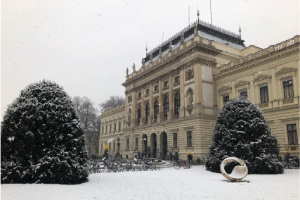Universitaetsplatz 3, 8010 Graz, Austria
Career Counselling

Karl Franzens Universitaet Graz is the second oldest University in Austria. Established in 1585, it is now home to almost 30,000 students, of whom more than one sixth are from outside Austria. As a progressive institution of higher education, it strives for complete equality, with barrier free access to all University locations for disabled students, and equal gender representation across Faculties.
Academic and research activities at the University of Graz are divided into six Faculties (Catholic Theology, Law, Business, Economics and Social Sciences...
| Establishment year | 1585 |
| Total Students | 29,419 |
| International Students | 5,089 |
| QS World University Rankings 2024 | 661-670 |
| Campus Size | N/A |
| Total Number of Campuses | 1 |
| University Website | https://www.uni-graz.at/en/ |
| No. of Schools and Divisions | 6 Faculties |
| Nobel Prize Winner Alumni | 6 |
| No. of Education Programs | 62 (undergraduate), 89 (Master’s) |
| Student to Faculty ratio | 8.9:1 |
Karl-Franzens-Universitaet Graz offers undergraduate and postgraduate courses through 6 Faculties, which are further subdivided into Institutes and Centers.
Academic and research activities are also carried out at 12 inter-faculty centres, including the Centre for Digital Teaching and Learning, the Coordination Centre for Gender Studies and Equality, the Confucius Institute, the Competence Centre for University Teaching, and the Centre for the History of Science.
International applicants to undergraduate courses at the University of Graz must satisfy the following requirements:
Applicants to Master’s Programmes at the University of Graz must satisfy similar requirements. However, instead of high school leaving certificates, they must submit provisional or final Bachelor’s degree certificates from a recognised global University, in addition to detailed academic transcripts. Certain courses, like the Master of Business Administration programme have additional eligibility criteria that are listed on the respective web pages.
The University of Graz evaluates applications in two broad phases: administrative (where checks of basic criteria fulfilment are conducted) and content-based (where the quality of the application is tested).
International applicants to both undergraduate and postgraduate courses at the University must complete these steps:
The University offers a free student information service that assists applicants with any queries related to the application and admission process.
All students of JKU, regardless of nationality, pay the Student Union fee of 21.20 Euros per semester (42.40 Euros per year); this is to be paid even if the tuition fee is waived due to EU citizenship or other considerations.
Students from Austria and the European Union do not have to pay tuition fees for the expected duration of their degree programme, with two extra semesters added. After this time period, they must pay tuition fees of 363,36 Euros per semester.
International students who are not from the European Union must pay tuition fees of 726.72 per semester, or 1453.44 Euros per year. Students from certain third world countries may have their tuition fee waived; the Office of International Relations can provide applicants with more information on this topic.
The University of Graz maintains a database with several housing operations in and around the main campus; the accommodation cost starts at 250 Euros per month, and can go up to 500 Euros per month. Students should also budget for other living costs, like food, transportation, and personal items.

The campus of Karl Franzens Universitaet Graz contains many iconic landmarks that are associated with the city of Graz. The central building is one of these, in addition to the historic Faculty buildings and the main library. Cyclists and e-scooters can be found everywhere in the main campus, reflecting the University’s commitment to sustainability and environmentally friendly transport.
Many buildings of the University are more than a century old; in a way, the historic architecture of the University of Graz makes it a work of art in itself. Cultural activities are a very common part of student life, with regular exhibitions, concerts, and theatre performances taking place. In addition to several museums on campus, there are also three exhibition areas, which are used to conduct popular science demonstrations and lectures that are open to the public.
The University of Graz has world class event management and hosting infrastructure, including ultramodern conference rooms and lecture complexes, in addition to the Great Hall. Therefore, it hosts many performers and artists of international acclaim. Concerts, parties, and lectures booked by external organisations add to the vibrant and dynamic nature of life on campus.

The University Sports Institute (USI) conducts a total of 300 fitness and sports courses (in sports like soccer, tennis, and basketball, personal gym training, group fitness classes, yoga, and meditation) with a total of over 9,000 participants, or almost 33% of all students at the University. Through this, it gives an opportunity for all members of the University community to stay fit and active, and to make healthy physical exertion a part of their busy academic schedules. The USI also conducts popular annual events like the Clover Leaf Race, a relay competition that attracts over 4,000 participants, making it one of the largest sports events at the University level in all of Europe. Students, staff members, and graduates of the University of Graz can access the services of the USI.
The Career Centre at Karl Franzens Universitaet Graz helps students develop employability skills and connects potential employers with students. All students and recent graduates of the University can use the online portal to view open jobs and internships, and book one on one career counselling sessions. The Career Centre also sets up networking events, workshops, presentations, and seminars. Finally, it provides job application and resume improvement resources, and coordinates Career Fairs, where students can meet prospective employers and learn more about the practical aspects of working in their chosen industry. The University of Graz maintains close ties with prominent companies and research universities across the world; students can use these networks to plan long term career moves after graduating from the University.
The Government of Austria, through the Austrian Study Grant Authority, provides several grants to students based on need and academic excellence; eligibility criteria and award amounts are detailed on the webpage. Other grants and scholarships can be found on the financial aid database website.
Information about Promotional and Merit Scholarships, which are typically awarded based on the recent average GPA of the candidate, can be obtained from the Dean’s Office of the Faculty in which the student is enrolled. These usually range (in award amount) between 750 and 1,500 Euros per year.
The deadlines for applications to all University scholarships are published in the Gazette; students are advised to check this document for information about payment schedules, selection requirements, and application timelines.
